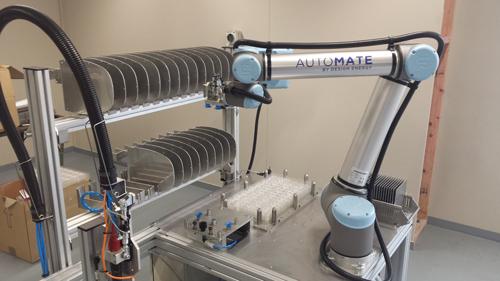A New Zealand outdoor lighting manufacturer has invested in robotic technology to ensure it stays ahead of the competition curve.
Established in 1988, Betacom Limited designs, manufactures and assembles a range of road, area and tunnel lighting products which are sold throughout New Zealand and Australia.
The company’s 3,500 square metre manufacturing and product design facility in Christchurch applies many technologies to ensure the highest quality product is delivered to its customers.
However, Betacom wanted to increase its automation capabilities so they sought out the advice and counsel of project engineering group, Design Energy.
To assist in finding an affordable and flexible solution, the team at Design Energy quickly resolved to apply a UR10 robot which is developed and manufactured by Universal Robots, a leader in the new industrial collaborative robotics market.
The UR10 was deployed to take over specialised production line tasks and support higher volume manufacturing runs. The enhanced automation enabled Betacom to service new high volume jobs with unparalleled precision due to increased orders for its new range of LED road lighting products from city councils throughout the country.
Quality assurance
One of the major factors in Betacom’s decision to deploy the UR10 robot was its ability to deliver a quality product.
Using a multi-head vacuum gripper the UR10 picks a circuit board from a rack and positions it on an aluminium pressing. The robot then picks six LED lenses and locates them onto the circuit board. The final step is to pick up a pneumatic screwdriver with auto feed screws and fasten the lenses and circuit board to the aluminium pressing.
Given the lenses need to be positioned in different orientations to ensure the best spread of light, Betacom was very focused on ensuring no mistakes were made during the production process to guarantee the delivery of a high functioning product. Another benefit is that both the LEDs and lenses are not touched by human hands ensuring minimum contamination.
According to Mike Shatford of Design Energy, the UR10 met Betacom’s needs because quite simply it doesn’t make mistakes.
“Universal Robots’ technology has revolutionised the manufacturing process, especially for products that require speedy, precise and consistent movements between waypoints. The UR10 removes the risk of missing a screw, ensures good thermal contact between the LED board and the base plate and guarantees the correct positioning of the lenses. The result is a consistently uniform product output each and every time.”
A clean environment
One of the major elements in the new production regime for the manufacture of street lights is the need for a “clean environment”.
The aluminium plate assembly was a highly repetitive, tedious but very precise process; particularly when it came to the handling of the LED lenses.
Betacom wanted a hands-off approach to placing the LED lenses in place because if they were touched by human hands and were left covered in finger prints the product performance may be affected.
“The use of the UR robot meant Betacom could automate the production process while maintaining the clean environment needed because it requires minimum human intervention,” said Shatford.
Ease of use
The ease of programming and the fact that the UR10 is a collaborative robot were also compelling factors in the purchase decision for Betacom. Many other industrial robots that could have been applied to the Betacom production line were much more complex and required coding knowledge.
Shatford comments that the Betacom decision was also based on the fact that following the necessary risk assessments, the UR10 did not require safety shields which meant their staff could work side-by-side with the robot in a collaborative and safe way.
“The level of complexity in the robotic technology was approachable for Betacom; they could see their workers being able to easily program and operate the robot. I think it was the user friendliness that really appealed to them as well as its safety features.
“Betacom had not applied robotics of this kind to its manufacturing process before. They own a sheet metal shop where they use automated stamping and punching devices, but they hadn’t deployed robotics technology before,” said Shatford.
“They understood that automation was the best option for this process and the UR10 enabled us to create an automated solution at a price point which made sense.”
Unique application
Design Energy was engaged to map out and develop the process which allows the robot to assemble the necessary components onto the PCB. The production process is unique in its application so it required their expertise from the very beginning to ensure the deployment went as smoothly as possible.
“It’s not as simple as sell them the robot, deliver it to the manufacturing facility, and then flick the switch. Our role is much more involved than that and we work closely with our customers to ensure the robot is adding the value that it should be,” said Shatford.
“The Betacom deployment is currently in the early stages however we are very confident that it will provide a strong ROI and lay the foundation for future business development.”



